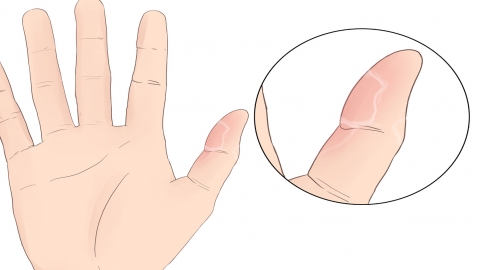What causes fluid accumulation and swelling in the fingers?
Generally, the main causes of fluid accumulation and swelling in the fingers include tissue edema after trauma, overuse injury, rheumatoid arthritis, finger tenosynovitis, and gouty arthritis. If discomfort occurs, it is recommended to seek timely medical evaluation and treatment at a正规 hospital. Specific explanations are as follows:

1. Tissue Edema After Trauma
When fingers suffer impact, compression, or sprain, local blood vessels may rupture and bleed, causing tissue fluid to exude and resulting in fluid accumulation and swelling. Within the first 48 hours after injury, apply cold compresses to reduce fluid leakage; after 48 hours, switch to warm compresses to promote absorption. Use elastic bandages for moderate compression, avoid excessive finger movement, and elevate the affected limb above heart level to accelerate swelling reduction.
2. Overuse Injury
Long-term repetitive finger movements—such as typing or knitting—cause repeated friction between tendons and joints, leading to tissue congestion and edema that result in fluid accumulation. Reduce repetitive hand activities, take a 5-minute break every 30 minutes of work, gently massage the finger joints, and soak hands in warm water for 10 minutes to relieve strain.
3. Rheumatoid Arthritis
Rheumatoid arthritis is caused by abnormal immune function, with inflammation attacking finger joints, leading to synovial proliferation and fluid accumulation, accompanied by pain and stiffness. Under medical guidance, medications such as methotrexate tablets, leflunomide tablets, and diclofenac sodium sustained-release tablets may be used. Avoid exposing fingers to cold, wear finger supports to protect joints, and have regular checkups for inflammatory markers.
4. Finger Tenosynovitis
Repeated tendon friction leads to tenosynovitis, increasing fluid within the tendon sheath and causing finger swelling and restricted movement. Under medical supervision, drugs such as celecoxib capsules, ibuprofen sustained-release capsules, or loxoprofen sodium tablets may be taken. Local corticosteroid injections can be administered as adjunct therapy. In severe cases, surgical tendon sheath decompression may be required, followed by gradual rehabilitation exercises for finger function.
5. Gouty Arthritis
Elevated uric acid levels in the body lead to deposition of uric acid crystals in finger joints, triggering an inflammatory response that causes fluid accumulation, swelling, and severe pain. Under medical guidance, medications such as allopurinol tablets, febuxostat tablets, or benzbromarone tablets may be prescribed. Avoid high-purine foods, drink plenty of water to promote uric acid excretion, and minimize finger movement during acute flare-ups.
In daily life, protect fingers from injury and avoid overuse. Keep hands warm to prevent exposure to cold. Maintain a balanced diet and control intake of foods that increase uric acid. Perform appropriate finger stretching exercises to maintain joint flexibility. Seek prompt medical attention if swelling or fluid accumulation worsens, to identify the underlying cause and prevent delayed treatment.





